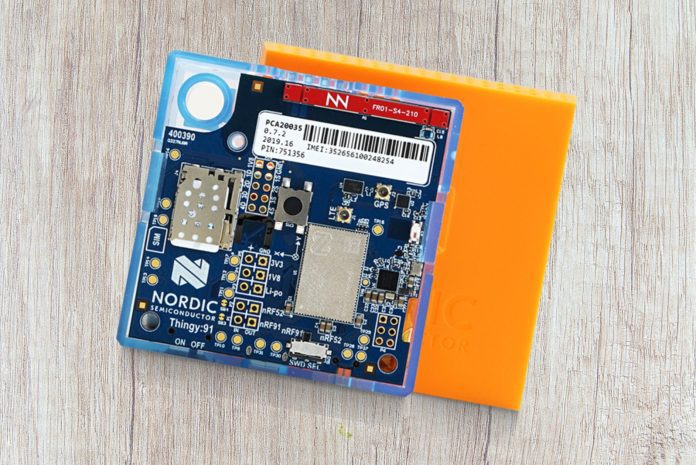Nokia and Nordic Semiconductor are to make Nokia-owned Standard Essential Patent (SEP) licences available with the purchase of cellular IoT hardware from the Norway-based chip and module maker. The cellular IoT industry has moved systematically over the past 12 months, or so, to tackle a number of challenges (roaming, billing, interoperability, for example) related to IoT development; the issue of patent licensing is for some, including Nordic, the last piece of the puzzle for cellular IoT to scale.
The arrangement gives Nordic’s customers the chance to licence the Finnish vendor’s NB-IoT and LTE-M patents with purchases of IoT hardware from the Norwegian outfit; the licences will be available at the device level. Nordic said the deal, described as the first of its kind, will facilitate “amicable and efficient licensing”, and “simplify and speed up” the SEP process. IoT makers will have “greater transparency and predictability”, it said.
Nordic makes cellular-based long-range wide-area (LPWA) NB-IoT and LTE-M products, alongside (and crossed with) a legacy line of short-range IoT modules, including Bluetooth Low Energy (BLE), Bluetooth mesh, Zigbee, Matter, and OpenThread, plus proprietary 802.15.4 protocols. To now, patent licensing has worked as a legacy of the old world, turning each year on a handful of bigger-ticket devices, such as smartphones and base stations.
It does not transfer easily to the new one, argues Nordic, where an unknowable range of different devices will be connected for an unknowable range of applications. “That is the last thing that is holding this back,” Svein-Egil Nielsen, chief technology officer at Nordic, told these pages in October. The cellular industry, at large, is still working out how to charge for SEP usage in IoT applications, including in cars, domestic appliances, and industrial robots.
In particular, litigation has bogged down SEP licensing in vehicles, with disputes about where in the supply chain licensing should occur – from chip, to module, to telematic control unit (TCU), to the vehicle itself. The confusion has delayed payments of fair, reasonable, and non-discriminatory (FRAND) royalty charges in many cases; the massive IoT movement has been grossly impeded, said Nielsen, speaking a few months back.
“To apply an LTE standard, you have to pay patent fees to someone – and in the mobile space that is invariably Ericsson, Nokia, Qualcomm, and a few others. They send an invoice, and you have to pay – and it has been that way for 20 years.” The IoT sector is disjointed, however, and the same methodology does not work. “There isn’t an established system to do it in an easy way – a single place to go… The whole process, as it is, takes a lot of time.”
A similar solution to IoT certification is required, said Nordic, where a universal fee can be applied to simplify SEP management. The deal with Nokia appears to go some way to resolve the issue for Nokia patents on Nordic parts. Nordic said: “Nokia has defined, and contributed to open standards, many of the fundamental inventions used in virtually all cellular devices and LTE-M and NB-IoT technologies. In practice, this means any device that is connected to any cellular network automatically uses Nokia’s intellectual property.”
Kjetil Holstad, executive vice president for product management at Nordic Semiconductor, commented: “Nordic Semiconductor is all about making IoT easy for its customers. Through this collaboration with Nokia, we have now added transparency and predictability early in the design process, giving the increased clarity and certainty Nordic cellular IoT customers have been seeking over the past three to four years.”
Jenni Lukander, president at Nokia Technologies, said: “Nokia has a history of working closely with industry to find effective licensing solutions and this innovative new approach is another example. It’s a win-win for Nordic’s customers and Nokia, simplifying the SEP licensing process in the IoT space and making it easier for licensing agreements to be concluded amicably and efficiently. The move will support the future growth of cellular IoT and ensure that consumers benefit from an even greater range of connected products and services.”

